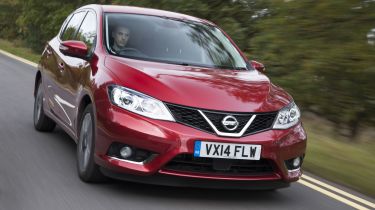Nissan Pulsar 2014-2018 review - Reliability and Safety
Driver Power results hint at reliability and quality issues, but there are no such concerns over occupant safety

The Pulsar shares many of its mechanical components and electrical systems with the second generation Qashqai, which has performed reasonably well in our Driver Power survey.
Yet while the crossover has scored strongly for comfort and in-car technology, its patchy build quality has come in for some criticism. Just as disappointing was the performance of Nissan’s franchise network, which finished 29th out of 31 in our dealer survey.
While there are question marks over the Pulsar’s durability, there are no such worries about its safety credentials. All variants get a full complement of six airbags, stability control and a programmable speed limiter as standard.
Further peace of mind comes with Nissan’s award-winning Safety Shield technology, which includes a standard-fit low-speed collision avoidance system called Forward Emergency Braking on Acenta models and above.
Go for the n-tec and you’ll benefit from all-LED headlamps and a reversing camera, while the range-topping Tekna gets the added benefits of lane departure warning, blind spot monitoring and a 360-degree surround view camera set-up.
The Pulsar also scored a top five-star rating in the Euro NCAP crash tests in 2014, and was praised in particular for offering the same high level of protection to occupants of disparate shapes and sizes. This included NCAP’s 18-month old toddler-sized crash test dummy - which should offer reassurance to parents.
Warranty
All Nissans come with a three-year/60,000 mile warranty, which is about average for this class. If you want more cover, it’s worth remembering that the Hyundai i30 comes with a five-year warranty and the Kia Ceed has a seven-year warranty.
Servicing
Nissan’s fixed-price Service Care offer applies to the Pulsar, with minor services costing from around £150 on petrol models and £160 on diesel cars.
Major services are around £220 and £250, and Pulsar service intervals come every 12,500 miles for petrol models and every 18,000 miles for diesels.






